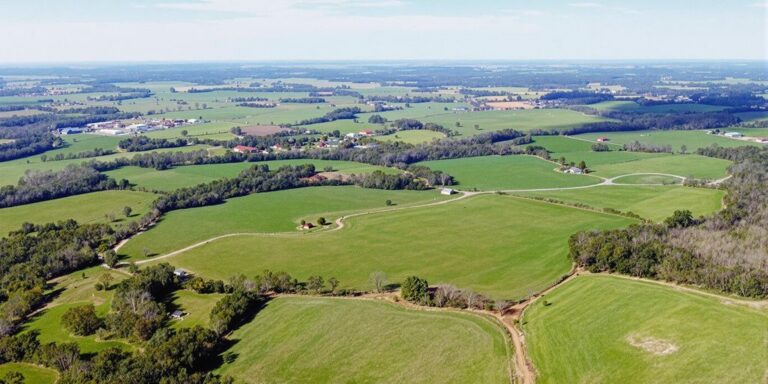Thinking about selling land in Arkansas? It’s a big decision, and figuring out the best way to do it can feel a bit overwhelming. You’ve got options: the usual way with a real estate agent, trying to sell it yourself, or even getting a direct cash offer. Each path has its own good points and not-so-good points, especially when you’re looking at how much money you’ll actually end up with. This article will help you sort through it all, so you can pick the best method for your Land Sale in Arkansas.
Key Takeaways
- Consider your priorities: speed of sale vs. maximizing profit.
- Traditional listings can bring more money but take longer and involve fees.
- Selling your land yourself saves on agent fees but requires more effort.
- Cash offers mean a fast sale, often “as-is,” which can be great for urgent situations.
- Always compare different offers and understand all the costs involved before deciding.
Understanding Land Sale in Arkansas
Traditional Listing Process
Okay, so you’re thinking about selling land in Arkansas. The traditional route usually involves getting a real estate agent. They’ll list your property, handle showings, and help with negotiations. It’s the most common way people sell, but it’s not always the fastest or cheapest. You’ll need to sign a listing agreement, usually for a few months, and pay a commission when the land sells. This commission is typically a percentage of the sale price, split between the listing agent and the buyer’s agent.
- Agent lists the property on the MLS.
- Showings are scheduled and conducted.
- Negotiations are handled by the agent.
For Sale By Owner Approach
Going the “For Sale By Owner” (FSBO) route means you’re handling everything yourself. You’ll be responsible for marketing the property, showing it to potential buyers, and negotiating the sale. It can save you money on commissions, but it also requires a lot of time and effort. You’ll need to be prepared to answer questions, handle paperwork, and potentially deal with legal issues. It’s definitely more work, but you have more control. You’ll need to be good at marketing and negotiation. Make sure you understand all the legal requirements for selling land in Arkansas. You might want to consult with a real estate attorney to make sure you’re doing everything correctly. It’s a good idea to get a professional appraisal to accurately estimate land value.
- You handle all marketing and showings.
- You negotiate directly with buyers.
- You’re responsible for all paperwork.
Cash Offers From Professional Buyers
Cash offers from professional buyers are becoming increasingly popular. These buyers, often companies or investors, will make you a cash offer for your land, often closing the deal much faster than a traditional sale. The upside is speed and convenience. You avoid the hassle of showings, negotiations, and waiting for buyer financing. The downside? You might not get as much money as you would with a traditional sale. These buyers are looking for a deal, so they’ll typically offer below market value. However, if you need to sell quickly or want to avoid the headaches of a traditional sale, it can be a good option. It’s important to weigh the pros and cons carefully.
Selling to a professional buyer can be a good option if you need to sell quickly or want to avoid the hassle of a traditional sale. However, be prepared to accept a lower offer than you might get on the open market.
Preparing Your Land for Sale

Before you even think about listing your land, some prep work is essential. It’s not just about slapping a “For Sale” sign on the property and hoping for the best. Taking the time to properly prepare can significantly impact the speed of the sale and the final price you get. Let’s break down the key steps.
Assessing Property Condition
First things first, take a good, hard look at your land. What’s the terrain like? Are there any existing structures, even old ones? Are there any potential environmental concerns, like old dumpsites or areas prone to flooding? Document everything thoroughly. This isn’t about hiding problems; it’s about being transparent with potential buyers. If there are issues, addressing them upfront (or at least disclosing them) can prevent headaches down the road. Consider getting a professional inspection to identify any hidden problems. This can also help you prioritize any necessary cleanup or repairs. For example, clearing overgrown vegetation can make the land more appealing and easier to assess.
Estimating Land Value
Determining the right price is crucial. You don’t want to overprice and scare away potential buyers, but you also don’t want to leave money on the table. Start by researching comparable land sales in your area. What have similar properties sold for recently? Consider factors like size, location, zoning, and any unique features (like water access or timber value). Contacting an agronomist to understand its value is important. A market analysis is crucial for setting a competitive asking price. Don’t rely solely on online valuation tools; they can be inaccurate, especially for land. Consider getting a professional appraisal to get an objective assessment of your land’s worth. Remember, the perceived value can also be influenced by factors like the overall economic climate and the demand for land in your region.
Understanding Seller Motivations
Why are you selling? Are you in a hurry to sell, or can you afford to wait for the right offer? Are you primarily concerned with getting the highest possible price, or are other factors (like a quick and easy sale) more important? Your answers to these questions will significantly influence your selling strategy. If you need to sell quickly, you might be more willing to accept a lower offer. If you’re not in a rush, you can afford to be more patient and hold out for a better deal. Understanding your motivations will help you make informed decisions throughout the selling process.
It’s important to be realistic about your expectations. Selling land can be a complex process, and it’s not always easy to get exactly what you want. Be prepared to compromise and be flexible in your negotiations.
Navigating the Offer Stage
Evaluating Cash Offers
Cash offers can be really appealing, especially if you need to sell your land quickly. The big advantage is the speed and certainty of the deal. You skip the whole mortgage approval process, which can take weeks or even months. But don’t just jump at the first cash offer you see. Take a close look at the numbers. Are they offering a fair price? Sometimes, cash buyers are looking for a bargain, so make sure you’re not leaving money on the table. It’s a good idea to get an independent appraisal to know the true value of your land before you start selling your lot.
Considering Contingencies
Contingencies are conditions that need to be met before the sale goes through. Common ones include financing, inspections, and appraisals. If a buyer needs to sell their current property first, that’s another contingency. More contingencies mean more uncertainty. A cash offer usually has fewer contingencies, which makes the sale more likely to close. Think about what’s important to you. Are you willing to wait longer for a higher price, or do you prefer a quick, sure thing? Here’s a quick look at common contingencies:
- Financing Contingency: Buyer needs to secure a mortgage.
- Inspection Contingency: Buyer has the right to inspect the property and back out if they find problems.
- Appraisal Contingency: The property must appraise at or above the sale price.
It’s important to understand that every contingency adds a layer of complexity and potential delay to the sale. Weigh the pros and cons carefully before agreeing to any contingencies.
Negotiating Terms Effectively
Negotiation is a key part of the offer stage. Don’t be afraid to counteroffer if you’re not happy with the initial offer. Maybe you want a higher price, or maybe you want the buyer to cover some of the closing costs. Be clear about what you want and be prepared to walk away if you can’t reach an agreement. Remember, it’s not just about the price. The terms of the sale are just as important. Consider these points during negotiation:
- Be realistic: Know the market value of your land and don’t expect to get more than it’s worth.
- Be flexible: Be willing to compromise on some points to get what you really want.
- Be professional: Keep your emotions in check and treat the buyer with respect.
Choosing the Right Sale Method

Selling land in Arkansas involves choices. Do you go the traditional route, try to sell it yourself, or take a cash offer? Each has pros and cons, and the best choice depends on your situation.
Traditional vs. Non-Traditional Sales
Traditional sales usually mean listing with a real estate agent. They handle marketing, showings, and negotiations. Non-traditional sales include cash offers from professional buyers or trying to sell the land yourself. The right path hinges on your needs.
Benefits of Cash Offers
Cash offers provide speed and certainty. You avoid the hassles of showings, negotiations, and potential financing issues. Here’s a quick look at some benefits:
- Faster closing times (often within weeks).
- No need for appraisals or inspections.
- Reduced risk of the deal falling through.
Cash offers can be particularly appealing if you need to sell quickly due to financial reasons, relocation, or other urgent circumstances. They offer a straightforward way to get cash for your land without the usual delays.
Streamlined Selling Solutions
Professional land buyers offer streamlined solutions. They simplify the process, handling all the paperwork and closing quickly. This can be a good option if you want a hassle-free sale. It’s worth considering if you value convenience over potentially maximizing profit. Selling land can be easy with the right selling solutions.
Financial Implications of Land Sale in Arkansas
Impact of Agent Fees and Commissions
Selling land in Arkansas often involves real estate agents, and their fees can significantly impact your net profit. Commissions typically range from 5% to 6% of the sale price, split between the listing agent and the buyer’s agent. For example, on a $200,000 land sale, you could pay $10,000 to $12,000 in commissions. This is a substantial cost to consider when evaluating your potential earnings. If you’re considering selling, it’s important to understand the role of professional home buyers and how they can affect these costs.
Potential for Seller Concessions
Seller concessions are another financial aspect to consider. These are costs that you, as the seller, might agree to cover for the buyer. Common concessions include covering a portion of the buyer’s closing costs or offering a credit for needed repairs. These concessions can make your property more attractive to buyers, but they also reduce your net proceeds. Seller concessions can range from 0 to about 2% of the purchase price, depending on market conditions and negotiation.
Estimating Net Proceeds
Estimating your net proceeds is crucial for understanding the financial outcome of your land sale. This involves subtracting all associated costs from the sale price. These costs include agent commissions, seller concessions, closing costs, outstanding property taxes, and any other fees. Accurately estimating these expenses will give you a realistic view of your potential profit.
It’s a good idea to create a detailed spreadsheet to track all potential costs and revenue. This will help you make informed decisions throughout the selling process and avoid surprises at closing. Don’t forget to factor in potential capital gains taxes on the profit from the sale.
Here’s a simplified example:
| Item | Amount |
|---|---|
| Sale Price | $150,000 |
| Agent Commissions (6%) | -$9,000 |
| Closing Costs | -$2,000 |
| Seller Concessions | -$1,000 |
| Net Proceeds | $138,000 |
Exploring Leased Land Options
Leased land is an interesting alternative to traditional land ownership. Instead of buying the land outright, you lease it from someone else. This can affect everything from property taxes to resale value. Let’s take a closer look at the pros, cons, and things to think about if you’re considering this route.
Pros of Leased Land
Leasing land can sometimes be more affordable upfront. You don’t have to shell out a huge sum for the land itself, which can free up capital for other investments or improvements. Here are some potential advantages:
- Lower initial cost: This is the most obvious benefit. You’re only paying for the right to use the land, not the land itself.
- Access to desirable locations: Leased land might be available in areas where buying is too expensive.
- Potentially lower property taxes: Since you don’t own the land, you might not be responsible for the full property tax bill.
Cons of Leased Land
While it might seem appealing, leased land comes with its own set of challenges. The biggest one is that you don’t actually own the land. This can impact your ability to make changes, build equity, and even sell the property later on. Here’s a breakdown:
- Limited control: The landowner has the final say on what you can do with the property.
- Lease payments: You’ll have ongoing lease payments, which can increase over time.
- Resale challenges: Selling a property on leased land can be more difficult than selling a property on owned land.
Leased land can be a good option for some, but it’s not for everyone. It’s important to weigh the pros and cons carefully and understand the terms of the lease agreement before making a decision.
Considerations for Buyers
If you’re thinking about buying a property on leased land, do your homework. Understand the terms of the lease, including the length of the lease, the amount of the lease payments, and any restrictions on the use of the land. Also, consider the potential impact on your ability to get a mortgage and sell the property in the future. Here are some key questions to ask:
- What is the remaining term of the lease?
- How much are the lease payments, and how often do they increase?
- What restrictions are there on the use of the land?
Maximizing Your Land Sale in Arkansas
Selling Fast vs. Maximizing Profit
When it comes to selling land in Arkansas, you’re often faced with a choice: do you prioritize speed or getting the highest possible price? There’s no single right answer; it depends entirely on your situation. If you need the money quickly, perhaps due to a job relocation or unexpected expenses, selling fast might be the better option. However, if you can afford to wait, taking the time to market your land effectively and negotiate offers could result in a significantly higher sale price. Think about your timeline and financial needs to determine your priorities.
Role of Professional Home Buyers
Professional home buyers can play a significant role in maximizing your land sale, especially if you value speed and convenience. These buyers typically offer all-cash deals and can close in a matter of days, eliminating the need for traditional financing and lengthy closing processes. While you might not get the absolute highest price possible, the certainty and speed of the transaction can be very appealing. They also handle all the paperwork, saving you time and potential headaches. If you are looking for streamlined selling solutions, they might be a good fit.
Comparing Competing Offers
Once you start receiving offers, it’s crucial to compare them carefully. Don’t just focus on the headline price; consider all the terms and conditions. Look at things like:
- Earnest money deposit: A higher deposit shows the buyer is serious.
- Contingencies: Fewer contingencies mean a smoother, faster closing.
- Closing date: Does it align with your timeline?
- Financing: Is the buyer pre-approved for a loan, or are they seeking financing?
It’s easy to get caught up in the excitement of an offer, but take a step back and analyze each one objectively. Consider consulting with a real estate professional or attorney to help you understand the fine print and make the best decision for your needs. Remember, the highest offer isn’t always the best offer if it comes with too many strings attached.
It’s also important to consider the buyer’s reputation and track record. Are they known for closing deals quickly and smoothly? Or do they have a history of backing out at the last minute? Doing your due diligence can save you a lot of time and frustration in the long run.
Here’s a simple table to help you compare offers:
| Offer Details | Offer 1 | Offer 2 | Offer 3 |
|---|---|---|---|
| Price | $X | $Y | $Z |
| Earnest Money | $A | $B | $C |
| Contingencies | Yes/No | Yes/No | Yes/No |
| Closing Date | Date | Date | Date |
| Buyer Financing | Yes/No | Yes/No | Yes/No |
| Buyer Reputation | Good | Fair | Poor |
| Overall Assessment |
Wrapping It Up: Your Best Bet in Arkansas
So, when it comes to selling land in Arkansas, there’s no single “best” way that works for everyone. It really just depends on what you need. If you’re in a hurry, or if your land needs a lot of work, a cash offer might be the way to go. You won’t get top dollar, but you’ll get a quick, easy sale without all the usual headaches. On the flip side, if you’ve got time and your property is in good shape, going the traditional route with a real estate agent could get you more money. It’ll take longer, and there will be fees, but you might end up with a bigger payout. Think about your situation, what you want most, and then pick the path that makes the most sense for you.
Frequently Asked Questions
What are the main ways to sell land in Arkansas?
Selling your land in Arkansas involves several steps, whether you go the traditional route with a real estate agent or opt for a cash offer. First, you’ll want to figure out your land’s true worth. Then, you decide how you want to sell it: either by listing it with an agent, trying to sell it yourself, or getting a quick cash offer from a professional buyer. Each way has its own pros and cons, especially when it comes to how fast you sell and how much money you end up with.
How does a traditional land sale work in Arkansas?
When you sell land the traditional way, you usually hire a real estate agent. They help you set a price, list your land online and elsewhere, show it to potential buyers, and handle all the paperwork. This can take longer because buyers often need bank loans, and there are inspections and appraisals. It might get you the most money, but it also means paying agent fees and waiting for the sale to close.
What’s a cash offer for land in Arkansas?
A cash offer means a buyer, often a company, buys your land directly with cash, without needing a bank loan. This makes the sale much faster and simpler. You usually sell your land “as-is,” meaning you don’t have to fix anything up. While it’s quick and easy, you might not get the very top dollar compared to a traditional sale, but you save on fees and time.
Which selling method is best for me: cash or traditional?
The best way to sell depends on what you need. If you want to sell super fast, avoid repairs, and don’t mind getting a bit less money, a cash offer is probably best. If you’re not in a hurry and want to try for the highest possible price, even if it means more work and waiting, then a traditional listing with an agent might be better for you.
Are there hidden costs when selling land in Arkansas?
Yes, there are costs involved in selling land. With a traditional sale, you’ll likely pay real estate agent commissions (a percentage of the sale price), closing costs, and possibly money for repairs or improvements. With a cash offer, these costs are usually much lower or even nonexistent, as cash buyers often cover closing costs and buy land in any condition.
What is leased land and how does it affect selling or buying?
Leased land means you own the building or property on the land, but you pay rent to someone else for the use of the land itself. For buyers, this can mean a lower upfront purchase price for the property, but you’ll have ongoing monthly land lease payments. For sellers, it’s not directly about selling your land, but it’s an option for buyers that might make your property more attractive if you’re selling a structure on leased land.






